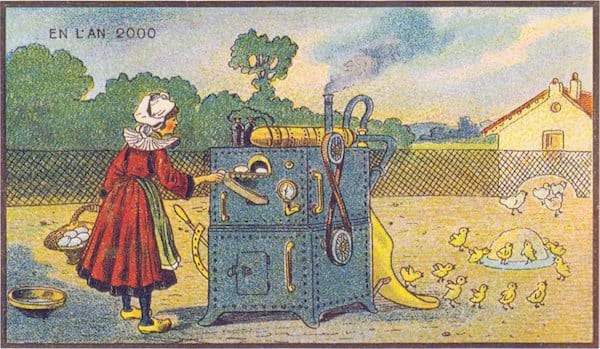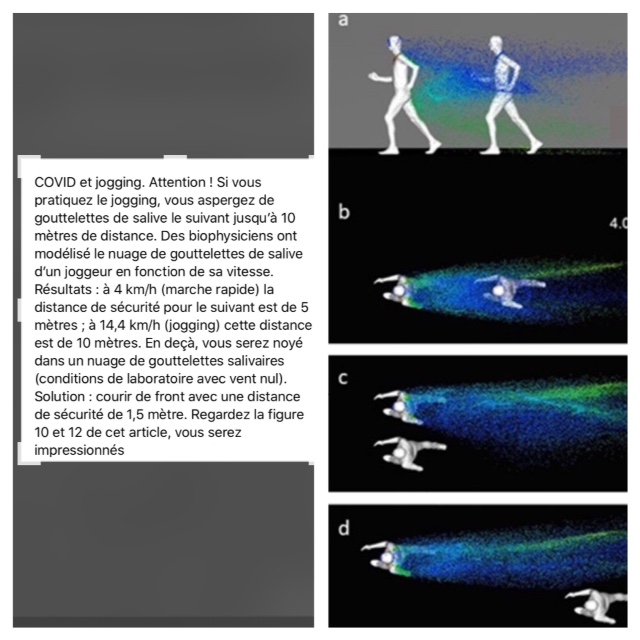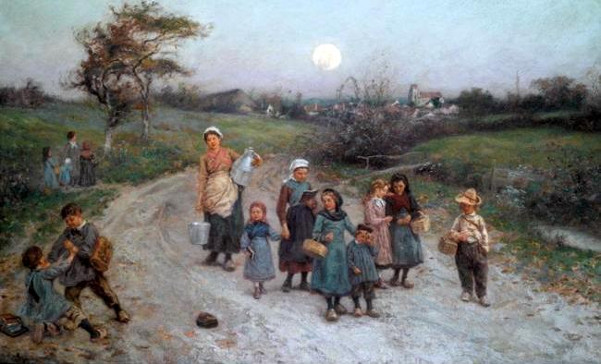|
You
can also view the message online
|
||||||||||||||
 Châtenay-Malabry (FR - 92290), April 27, 2020 EFITA newsletter / 927 - European Federation for Information Technology in Agriculture, Food and the Environment To unsubscribe this newsletter, please contact me directely: guy.waksman(a)laposte.net if this link Unsubscribe does not work. Please note that I changed the presentation of the links that are embedded in the name of the web service. 
To correspond with me (GW), please use this address: guy.waksman(a)laposte.net To subscribe the efita newsletter (please ask your friends and colleagues to test this link) Efita Newsletters subscription Weekly newsletters about ICT in Agriculture in English and French Both newsletters have around 14000 subscribers. >>> Last weekly EFITA Newsletters in English (created in 1999) Efita Newsletters >>> Last weekly AFIA Newsletters in French (created 20 years ago in 1997) Afia Newsletters Around 15% of subscribers have a look on these newsletters. A rather normal rate… The archive for the last years are available on the AFIA web site. >>> Statistics about the previous issue of the efita newsletter dated April 20, 2020 >>> Statistics about the afia newsletter dated April16, 2020 >>> Last issue of the afia newsletter dated April 23, 2020 How we saw the future yesterday?
COVID-19: The first modern pandemic. The scientific advances we need to stop COVID-19. By Bill Gates Melinda and I grew up learning that World War II was the defining moment of our parents’ generation. In a similar way, the COVID-19 pandemic—the first modern pandemic—will define this era. No one who lives through Pandemic I will ever forget it. And it is impossible to overstate the pain that people are feeling now and will continue to feel for years to come. The heavy cost of the pandemic for lower-paid and poor people is a special concern for Melinda and me. The disease is disproportionately hurting poorer communities and racial minorities. Likewise, the economic impact of the shutdown is hitting low-income, minority workers the hardest. Policymakers will need to make sure that, as the country opens up, the recovery doesn’t make inequality even worse than it already is. At the same time, we are impressed with how the world is coming together to fight this fight. Every day, we talk to scientists at universities and small companies, CEOs of pharmaceutical companies, or heads of government to make sure that the new tools I’ve discussed become available as soon as possible. And there are so many heroes to admire right now, including the health workers on the front line. When the world eventually declares Pandemic I over, we will have all of them to thank for it. See gatesnotes.com COVID-19: Schäuble will dem Schutz des Lebens nicht alles unterordnen Im Interview spricht Wolfgang Schäuble über die Suche nach dem richtigen Maß in der Corona-Krise und über das, was nach der Pandemie anders sein wird >> Herr Schäuble, in der Corona-Politik gibt es Vorsichtige und Lockermacher – zu welcher Gruppe würden Sie sich zählen? Ich glaube nicht, dass es unter den Verantwortlichen diese zwei strikt gegensätzlichen Fraktionen wirklich gibt. Wir wissen schließlich alle nicht so genau, wie es mit der Pandemie weitergeht. Auch die Wissenschaftler haben in Diskussionen über die letzten Wochen ihre Meinung weiterentwickelt. Ich teile deshalb die Meinung der Allermeisten: Wir müssen die verschiedenen Gesichtspunkte klug abwägen. >> Die meisten Virologen plädieren allerdings klar für einen weiteren strikten Lockdown! Wir dürfen nicht allein den Virologen die Entscheidungen überlassen, sondern müssen auch die gewaltigen ökonomischen, sozialen, psychologischen und sonstigen Auswirkungen abwägen. Zwei Jahre lang einfach alles stillzulegen, auch das hätte fürchterliche Folgen. >> Sie sagen mit Recht: „auch“. Die Kanzlerin findet manche Lockerungen „zu forsch“? Man muss vorsichtig Schritt für Schritt vorgehen und bereit sein, zu lernen. Manche sagen, wenn's zu viel war, muss man Lockerungen wieder zurücknehmen. Das Zurücknehmen würde aber viel schwieriger. Sehen tagesspiegel.de COVID-19: Schäuble says saving lives should not be paramount concern Over the weekend, Bundestag President Wolfgang Schäuble of the Christian Democratic Union (CDU) advocated for a more even calculus between public health and the economic and social consequences of a prolonged shutdown, fearing an overload of state capacities. He also disagreed with subordinating all other concerns to the goal of saving lives, claiming "this in its absolutism is not correct," as the German constitution's right to human dignity "does not exclude the possibility that we must die." "We must not leave decisions to the virologists alone, but must also weigh up the enormous economic, social, psychological and other implications. To simply shut everything down for two years would have terrible consequences," he told EURACTIV’s media partner Der Tagesspiegel in an interview published Sunday (26 April). See euractiv.com Good old days (?????): The Harvesters by Julien Dupré More then one farmer a week in the UK dies by suicide See farmbusiness.co.uk Selbstmorde bei Landwirten: Das sind die Ursachen Sehen agrarheute.com Why are America’s farmers killing themselves? The suicide rate for farmers is more than double that of veterans. A former farmer gives an insider’s perspective on farm life – and how to help « The US farmer suicide crisis echoes a much larger farmer suicide crisis happening globally: an Australian farmer dies by suicide every four days; in the UK, one farmer a week takes his or her own life; in France, one farmer dies by suicide every two days; in India, more than 270,000 farmers have died by suicide since 1995. » See theguardian.com
2020 Challenge: An international computer science competition to count wheat ears more effectively, using image analysis (The first prize is $15,000 USD) 4 May - 4 August 2020 For several years, agricultural research has been using sensors to observe plants at key moments in their development. However, some important plant traits are still measured manually. One example of this is the manual counting of wheat ears from digital images – a long and tedious job. Factors that make it difficult to manually count wheat ears from digital images include the possibility of overlapping ears, variations in appearance according to maturity and genotype, the presence or absence of barbs, head orientation and even wind. COPEEKS: Monitor your productions >> Livestock > Real-time monitoring of the livestock building: the PEEK box records ambient data from the rearing building such as CO2 level, NH3, temperature and humidity > Animal behaviour analysis: the videos and photos produced are analysed in real time to determine the level of agitation of the animals, their location in the area or their posture. > Customizable and adaptable: available for all types of production (swine, poultry, ruminants), it can be moved and adapted to all kinds of situations Plants > Agronomical parameters: get accurate ambient data and be alerted in real time (water stress, soil moisture,...) > Remote monitoring of the culture: manage your cultural interventions by watching the photos and data collected on a computer or a smartphone (growth stage, weed emergence, flowering,......) > Pests detection: automate the pest counting in your crops (funnel trap, bowl, sticky plate, delta) See copeeks.fr It may be useful for some of you: Towards aerodynamically equivalent COVID19 1.5 m social distancing for walking and running NewAgInternational March/April 2020 > Drone- based aerial biocontrol (p. 18-19) > Harnessing plasmonic for precision agriculture worldwide (p. 24) > Drone image detect two tomato diseases with 99 percent accuracy(p. 24) > New drone technology for Ag (p. 25) > New digital Ag research station to help future proof farms (p. 25) > Robots in the field and greenhouse: the future is there (p. 26-28) See newaginternational.com AgGateway news See aggateway.org/ Vertical farming sector struggles with costs Despite optimistic growth forecasts, the vertical farming industry faces huge challenges. See futurefarming.com Digital crop insurance framework in Nigeria Agritask and Royal Exchange partner to to create a digital crop insurance framework in Nigeria. See futurefarming.com Good old days (?????): Arenlezers by Emile Claus - 1894
Beginner’s guide to agricultural drones Drones are becoming increasingly important in agriculture and more and more farmers are considering purchasing a drone. But how do you get started? Dr. Jason de Koff explains the basics of agricultural drones. See futurefarming.com Supply chains must be shortened and localised, urges FAO Whilst addressing the Agriculture Ministers of the G20 countries, the FAO Director-General highlighted essential actions that must be taken in order to maintain the supply chains of the future. See newfoodmagazine.com Hotter, wetter, drought, fires: climate change’s impact on global agriculture via satellite imagery Emily Negrin is director of global communications & marketing for Geosys, the satellite imagery analytics business. For Earth Day, we asked her to provide an overview of how climate change has impacted agriculture industries all over the world using data from the company’s 2019 Climate & Crop Report. Once owned by Land O’ Lakes, Geosys was acquired by UrtheCast in 2018. See agfundernews.com Good old days (?????): The return from school in Calvados by William John Hennessy (1839 - 1917)
Geosys Harvesting data from satellite imagery to help customers better monitor crops, understand growing conditions and mitigate risks. - Precision Ag & Farm Services: Monitor and benchmark fields, optimize inputs - Commodities Trading & Logistics: Objectively monitor and analyze crop production - Crop Insurance & Financial Risk Mitigation: Minimize risk with unbiased, third-party data See urthecast.com/geosys/ Satellite Imaging. Geoanalytics. Insights Track long-term trends, monitor shorter term change, and take guided, strategic actions to better serve your customers and fulfil your mission. We are a satellite imaging company developing world-first technologies in data services, geoanalytics, machine learning and AI. The insights we provide allow customers in multiple industries to track long-term trends, monitor change, and take guided, strategic actions to better serve their customers and fulfil their missions. In 2022, UrtheCast will launch UrtheDaily, the world’s first earth observation system designed from the ground-up to produce scientific-quality imagery of the entire earth every day. - Geosys: More than 30 years of experience in agricultural analysis of satellite and weather data. Learn how our global geo-information services can help grow your business. - UrtheDaily: At 10:30 am every day, see change as it happens. True scientific-quality imagery of the whole world at 5-meter resolution. - Industry Use Cases: We do not just send images – we deliver data for business innovation. Find out how we are fuelling faster decisions in these industries. See urthecast.com
How are agrifood tech startups responding to Covid-19? Covid-19 has sent the startup world into a tailspin. Supply chain disruptions have threatened the supply of key components and ingredients and venture capital funds have signaled a pullback in activity with some startup valuations already dropping as much as 40%. And, looking further out, business growth predictions are increasingly uncertain as the ability for end-users to afford to invest in new tools and services will likely be impacted by the expected ensuing economic recession resulting from the pandemic. Agtech startups’ ability to succeed through the pandemic is only as good as a farmers’ willingness to continue purchasing their products and services. The farming industry is dealing with its own set of problems from uncertainty in supply and demand to labor shortages to family needs and personal health. .../... And in the most optimistic light, Schoenberg even posits the unthinkable: “I think if the pandemic stays as disruptive as it is now startups will pop up left and right. Startups exist because someone sees a problem that they don’t feel is being solved properly in the marketplace and they risk their livelihood to solve that problem,” he says. “And the fact that it’s so disruptive means that larger corporates will have to move. They can’t sit back and wait two years for R&D to make suggestions. They will be ready to embrace people out there making results.” See agfundernews.com IBM opens weather dashboard to Indian farmers and agritech startups during Covid-19 lull …/… According to Newzoo, smartphone penetration in India stood at 25.3% of the population in 2019. This underlines the potential adoption hurdle faced by IBM and other agritech providers – though internet use is growing rapidly throughout the country, including in rural areas. Kantar found that rural India saw 35% growth in the number of internet users in 2018, and estimates there are around 290 million rural internet users today – or 33% of a total rural population of about 892 million. IBM acquired The Weather Company’s product and technology assets from previous owners Bain Capital, NBCUniversal, and The Blackstone Group in January 2016 for over $2 billion, according to reports. See agfundernews.com From Trump to Erdogan, men who behave badly make the worst leaders in a pandemic, by Simon Tisdall See The Guardian Good old days (?????): Catherine La Rose by Charles Sprague Pearce (1851-1914)
The Island An Englishman, Irishman and Scotsman are stranded on an island when a magic lamp washes up on the beach. The Englishman picks it up and rubs it. Whoosh a genie appears. “I will each grant you a wish,” the genie says. The Englishman says, “I wish I was back home in the pub with a pint of beer and watching football.” And, whoosh, the Englishman vanishes. The Scotsman says, “I wish I was back home in the pub with a dram of whisky, watching the Highland games.” And, whoosh, the Scotsman vanishes. The Irishman looks at the genie and says, “Christ, it's lonely here now. I wish the lads were back”. The distribution of this efita newsletter is sponsored by vitisphere.com Please, contribute to the content of your efita newsletter, and advertise your events, new publications, new products and new project in this newsletter. Without your support, it will not survive! Contact: Guy WAKSMAN E-mail: guy.waksman(a)laposte.net To read this newsletter on our web site See Afia The archives of this newsletter See Afia About the EFITA mailing list You can use the efita moderated list (> 15000 subscribers) to announce any event / product / web site / joke (!) related to IT in agriculture, environment, food industry and rural areas. If you want to subscribe a friend, please fill in his form. If you do not wish to receive our messages, please fill in the following form... |








